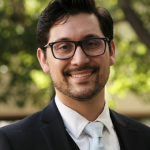
Ralph Pesce
rpesce@machebeuf.org

Juliette Roach
jroach@machebeuf.org
HUMANITIES OVERVIEW

Br. Andrew Brebeuf
abrebeuf@machebeuf.org

Br. Levi Mary
lmary@machebeuf.org
TRIVIUM OVERVIEW
The Trivium courses focus on teaching the critical skills of reading, writing, speaking, and persuasively arguing. From freshman to junior year, students begin with Grammar—the study of the structure of language—move to Logic—the study of the structure of thought and how our minds grasp truth—and combine these skills in Rhetoric where students learn to speak about the truth persuasively. At Machebeuf, students transition from the traditional Trivium sequence (Grammar, Logic, Rhetoric), and enter into an American Civics class in which they grapple with how to live as a Catholic in modern, secular American society.
COURSE DESCRIPTIONS
Grammar
Freshmen study the parts of speech and rules of English grammar in order to communicate more effectively. Through the specific study of grammar and through reading, analyzing, and imitating excerpts from great authors, students develop the ability to express their thoughts clearly, logically, and convincingly through writing.
Logic
Sophomores study the art and the science of thinking. Through the study of formal logic and informal fallacies, students gain the framework to live intelligently and to avoid many of the errors and deceptions they will encounter in the modern world.
Rhetoric
Juniors study the art of persuasion and how to convince others of what is true. Through the study of poetry, speeches, and essential principles of Rhetoric in the Aristotelian tradition, students will develop public speaking skills and cultivate an ability to analyze and understand the ways in which human beings are moved.
Civics
Seniors study the history and political culture of the United States of America. Through the study of texts that address fundamental events, figures, and themes in American history, students better understand their identity and responsibilities as citizens of America and how to respond to American culture from a Catholic worldview.
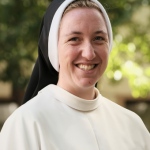
Sr. Rachel Marie Boyd, O.P.
rmarie@machebeuf.org
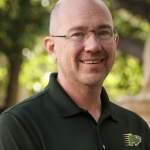
Ian Cole
icole@machebeuf.org
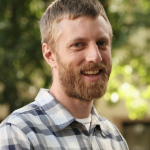
Cody Krueger
ckrueger@machebeuf.org
SCIENCE OVERVIEW
Science courses at Machebeuf seek to instill in students a firm knowledge and profound appreciation of the beauty and order of God’s creation. Through students’ study of the sciences, they will gain a better understanding of the world around them and learn how to be stewards of God’s creation.
COURSE DESCRIPTIONS
Biology & Honors Biology
Biology is a year-long laboratory course that seeks to awaken students’ natural wonder and curiosity in the presence of creation as they attend to the natural world and the study of life. The course examines the cycles, patterns and hierarchies within cellular biology, genetics, evolution, body systems, and ecology. These concepts and their scientific processes will be investigated in relation to other scientific disciplines, scientific literature, and current biological and ethical issues. Students will have multiple opportunities to engage in labs and hands-on learning. **Students taking Honors Biology will be exposed to material at a deeper level with an eye to preparation for Advanced Placement (AP) Science courses in their upperclassmen years. Additional micro-units including studies of virology, cancer biology and the intersection of faith and science in the questions of genetic research and evolution are also addressed in the Honors course.
Chemistry & Honors Chemistry
Chemistry seeks to understand and answer the fundamental searching questions of “what is this?” and “how does this work?”. This course exposes students to the structure and interaction of matter and energy in their many forms in an atmosphere of hands-on learning that supports and calls forth the inherent wonder toward the created world implanted in the soul of every human person. This course is designed to expose students to the basic concepts of chemistry. Topics include dimensional analysis, classification of matter, nomenclature, the mole concept, atomic structure, the periodic table, chemical bonding, states of matter, gas laws, solution chemistry, acids and bases, oxidation and reduction reactions, kinetics, and periodicity. Students will determine and describe chemical behavior. **Students taking Honors Chemistry will be exposed to material at a deeper level with an eye to preparation for Advanced Placement (AP) Science courses in their upperclassmen years.
Physics & Honors Physics
Physics is the study of the way things work in the physical world. It is a very broad field: while most people think of studying the impossibly vast cosmos or the tiniest particles of nature, physics happens everywhere. In this class, you will learn the fundamental concepts of physics—the basis for all applied science, technological development, and detailed scientific research. We will be incorporating labs, demonstrations, projects, and interactive activities to make the work more engaging and meaningful. **Students taking Honors Physics will be exposed to material at a deeper level with an eye to preparation for Advanced Placement (AP) Science courses in their upperclassmen years.
Anatomy & Physiology
Anatomy and Physiology is a one-semester course which introduces students to the study of human anatomy and physiology through an emphasis on the dignity of the human person at all stages of life while inviting students to wonder at the complexity and organization of the creation of the human person. Students will study the major body systems in the order in which they develop in utero, beginning with a brief focus on embryology and human growth and development. The cardiovascular, nervous and endocrine/reproductive systems will be given primary emphasis, and the other body systems will be addressed as time allows. Students will have multiple opportunities for dissections and other hands-on activities, as well as lectures from guest speakers. The course culminates in a series of discussions relating the students’ knowledge of anatomy and physiology to the ultimate question of what it means to be human.
AP Biology
AP Biology is an elective course that offers students a solid foundation in introductory college-level biology. Through the integrated structure of the class, students are led to develop an appreciation for the study of life which helps them identify and understand unifying principles within a diversified biological world. The course is guided by the four big ideas, enduring understandings, and science practices as proposed by College Board. The process of inquiry in science and developing critical thinking skills is a crucial part of this course. Through their study, students will gain a deeper understanding of the logic and order of creation through seeing the relationship between form and function in the biological world on both the micro and macro levels. This is a laboratory-based course and therefore formal labs, lab activities, and investigations will comprise 40% of instructional time. This is an intensive course and students should expect to spend time each day in study of the material. At the end of the course students are encouraged to take the AP Biology exam.
AP Chemistry
AP Chemistry is an elective course designed to be the equivalent of the general chemistry course usually taken during the first year of college. Students will obtain an understanding of chemistry foundations to support additional learning in chemistry. This course will develop critical thinking skills and the ability for students to clearly express their ideas and understandings. This is an intensive course and students should expect to spend time each day in study of the material. At the end of the course students are encouraged to take the AP Chemistry exam.
AP Physics
AP Physics is an elective course designed to be the equivalent of an introductory physics course taken at the college level. Students cultivate their understanding of physics through classroom study, in-class activity, and hands-on, inquiry-based laboratory work as they explore concepts like systems, fields, force interactions, change, conservation, and waves. This is an intensive course and students should expect to spend time each day in the study of the material. At the end of the course students are encouraged to take the AP Physics exam.

Sr. Rachel Marie Boyd, O.P.
rboyd@machebeuf.org

Michelle Oresky
moresky@machebeuf.org
MATH OVERVIEW
Mathematics courses at Machebeuf teach students to recognize the order and unity in God’s creation. These courses aid students in the development of skills such as analysis, attention to detail, and precision, that are necessary for the study of mathematics and applicable to all areas of life.
COURSE DESCRIPTIONS
Pre-Algebra
Pre-Algebra seeks to build a solid foundation of knowledge for all subsequent math courses a student will take. Students will master skills pertaining to integers, order of operations, algebraic expressions, proportions, percentages, and linear equations.
Algebra I
Algebra I aims to apply and extend what students have learned in pre-algebra by focusing on finding connections between multiple representations of linear equations. It continues the mathematical learning process then by developing understanding of the basic language of algebraic expression and the graphing of exponential, polynomial, and quadratic functions, connecting those functions to graphs and equations, and understanding statistical conclusions. All topics to be covered in this course include expressions and functions, linear equations, linear and nonlinear functions, equations of linear functions, linear inequalities, systems of linear equations and inequalities, exponents and exponential functions, polynomials, quadratic functions and equations, and statistics.
Geometry & Honors Geometry
Students will begin using the basic tools of geometry: points, lines, and planes, and will go on to study angles and angle pair relationships, as well as polygons. They will learn to construct proofs and learn the relationships of perpendicular and parallel lines as well as what constitutes congruent triangles. They will study types of triangles as well as what makes triangles similar. Right triangles and basic trigonometry will be an ongoing practice. Students will study quadrilaterals as well as circles, including arc measures, and the areas and lengths of sectors. They will learn how to calculate area, perimeter and to find the surface area and volume of three-dimensional shapes. Finally, students will learn the basic types of transformations and will learn to conduct compositions of transformations. **Students taking Honors Geometry will be exposed to material at a deeper level with an eye to preparation for Advanced Placement Math courses in their upperclassmen years.
Algebra II & Honors Algebra II
Algebra II is the second course in a sequence of college preparatory courses. It aims to apply and extend what students have learned in Algebra 1 by focusing on finding connections between multiple representations of linear and nonlinear functions, by finding solutions to a system of linear equations, by solving exponential, polynomial and quadratic functions and connecting them to graphs and to understanding the role of randomness and the normal distribution in making statistical conclusions. This course will also include preparation for the ACT/ SAT. **Students taking Honors Algebra II will be exposed to material at a deeper level with an eye to preparation for Advanced Placement Math courses in their upperclassmen years.
Precalculus & Honors Precalculus
This course will provide a comprehensive study of functions, which are the basis of calculus. Students will study properties and graphs of trigonometric, polynomial, rational, inverse, exponential and logarithmic functions in the first semester. During the second semester, the students will explore inequalities, polar coordinates, complex numbers, conic sections, matrices, vectors, sequences, series and limits. **Students taking Honors Precalculus will be exposed to material at a deeper level with an eye to preparation for Advanced Placement Math courses in their upperclassmen years.
AP Calculus
AP Calculus is an introductory college-level calculus course. Students cultivate their understanding of differential and integral calculus through engaging with real-world problems represented graphically, numerically, analytically, and verbally and using definitions and theorems to build arguments and justify conclusions as they explore concepts like change, limits, and the analysis of functions. Students taking this course are encouraged to take the AP Calculus exam.
AP Statistics
This year-long college level course will provide the formal development of the basic algebraic, visual, numeric statistic skills and concepts necessary for students to succeed in advanced courses and in everyday life. Students taking this course are encouraged to take the AP Statistics exam.
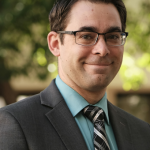
Robert Farris
rfarris@machebeuf.org
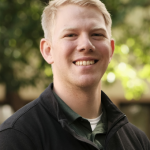
Christian Grandon
cgrandon@machebeuf.org

Br. Andrew Brebeuf
abrebeuf@machebeuf.org

Br. Peter Xavier
pxaviar@machebeuf.org
THEOLOGY OVERVIEW
The purpose of Theology courses at Machebeuf is to lead students to an encounter with Jesus Christ. Through their study of Sacred Scripture, Sacred Tradition, Church teachings, and Church history, students are prepared to enter the world as disciples of Christ.
COURSE DESCRIPTIONS
Theology I: Scripture
This is an introduction course to the Sacred Scriptures in which students will learn the story of Salvation History, the different historical contexts of the Bible, the major characters, some significant locations in Scripture, and specific passages from the bible. The students will also learn how to read the Scriptures and how to pray with the Scriptures. Students are expected to engage heavily with one text, namely the Bible itself.
Theology II: Creed & Sacraments
This course is an overview of the major beliefs of the Catholic faith, as stated in the Apostles’ Creed. Students will delve into the mystery of the nature of God as one God in three Persons, and will learn about Church teaching regarding the Persons of the Trinity. They will examine the relationship between faith and reason, especially in the thought of St. Thomas Aquinas, and will also have the opportunity to deepen their relationship with God through weekly prayer and adoration.
Theology III: Morality
Juniors continue their journey through the fundamentals of the Catholic faith by closely examining the third part of the Catechism: Life in Christ. This course looks at morality in light of faith as the means by which human persons cooperate with grace to pursue the universal call to holiness and supernatural happiness. In particular, students examine the human person as a moral subject acting responsibly, the principles of moral actions, virtue and vice, and different degrees of law. Ultimately, this course shows the heart of fulfilling God’s law lies in acting according to the two greatest commandments: love of God and love of neighbor.
Theology IV: Church & Modernity
Students will begin by reviewing the central components of a Catholic Worldview, which will touch on topics seen throughout previous Theology and Humanities classes. Following this, students will review how this worldview changed in the modern era. Understanding this transition into modernity is essential in order for students to grasp the historical circumstances surrounding the Church’s cornerstone of social doctrine: Rerum Novarum. This document will serve as a launchpad for the class to delve into the tremendous richness of the Church’s teaching on social issues. Students will read and discuss many of the encyclicals which are central to the Church’s response to the modern age in an attempt to help students approach today’s problems from a thoroughly Catholic and thoughtful perspective.
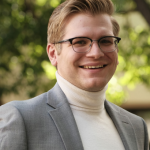
Richard Ciolek
rciolek@machebeuf.org

Michelle Oresky
moresky@machebeuf.org

Juliette Roach
jroach@machebeuf.org
LATIN OVERVIEW
All Machebeuf students are required to take Latin I and Latin II. The study of Latin forms students in discipline and habits of mind while also creating a strong foundation in study skills and content for all areas of study.
COURSE DESCRIPTIONS
Latin I
Latin I is a beginning course in which students will learn Latin primarily through grammar, syntax, and reading (rather than conversation). Students will engage in the following activities: reading Latin aloud and silently, composing Latin questions and sentences, translating Latin sentences into English, memorizing and using vocabulary, developing some listening and speaking skills, seeing how some English words can be understood from their Latin roots, learning about life in the early Roman Empire, memorizing Catholic prayers in Latin, and learning about the use of Latin in the Roman Catholic Church.
Latin II
Latin II is a continuation of the grammar, syntax, and reading of Latin I. After review of the major topics learned in Latin I, students will continue their study of the Latin language with the aim of learning the majority of grammar needed to begin reading authentic texts. Students will continue in the developing their skills at reading and composing Latin, translating Latin sentences into English, and memorizing vocabulary, learning about life in the early Roman Empire, memorizing Catholic prayers in Latin, and learning about the use of Latin in the Roman Catholic Church.
Honors Latin III
In Honors Latin III, students consolidate their knowledge of Latin vocabulary, morphology, and syntax as they begin the close reading of Latin prose and verse. In the Fall, students will focus on prose through the Letters of Pliny the Younger (c. 61-112 AD). Pliny’s Letters are incredible in the breadth of Roman society they portray in relatively accessible Latin. Students will learn about Roman high politics and the early Church from Pliny’s discussion with the emperor Trajan on the treatment of Christians, more everyday aspects of Roman life such as marriage and reading habits, and the Eruption of Mt. Vesuvius in 79 AD through Pliny’s firsthand testimony.
AP Latin
AP Latin introduces students to the reading and analysis of substantial works of Latin prose and verse through the reading of two of the most famous pieces of literature from antiquity: Julius Caesar’s Commentarii de Bello Gallico (Commentaries on the Gallic War) and Vergil’s Aeneid. In the Fall, students will focus on Caesar’s Commentarii—a firsthand account of the Roman conquest and subjugation of Gaul (modern-day France). In the Spring, students will read the Roman national epic, the Aeneid, and discuss its context within the Roman Revolution and rise of Augustus. This course is equivalent to a college level upper-intermediate reading course and will prepare students to take the College Board’s AP Latin Exam.

Katherine Candler
kcandler@machebeuf.org
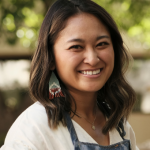
Sarah Tran
stran@machebeuf.org

Juliette Roach
jroach@machebeuf.org
COURSE DESCRIPTIONS
Spanish I
This course will introduce Spanish via comprehensible input, a proficiency-based learning method that emphasizes language acquisition. At the end of Spanish 1, students will reach Novice High proficiency (proficiency comes through interpreting, expressing, and negotiating the meaning of messages in the target language – Spanish). Students will work toward this proficiency by comprehensible readings and listening activities that students can make sense of in the target language.
Spanish III
This course will continue building students’ Spanish language skills via comprehensible input, a proficiency-based learning method that emphasizes language acquisition. At the end of Spanish 3, students will reach Novice High or Intermediate Low proficiency (proficiency comes through interpreting, expressing, and negotiating the meaning of messages in the target language – Spanish). Students will work toward this proficiency by comprehensible readings and listening activities that students can make sense of in the target language.
AP Spanish Language and Culture
The AP Spanish Language and Culture course emphasizes communication by applying interpersonal, interpretive, and presentational skills in real-life situations. This includes vocabulary usage, language control, communication strategies, and cultural awareness. The AP Spanish Language and Culture course strives not to overemphasize grammatical accuracy at the expense of communication. To best facilitate the study of language and culture, the course is taught almost exclusively in Spanish. The AP Spanish Language and Culture course engages students in an exploration of culture in both contemporary and historical contexts. The course develops students’ awareness and appreciation of cultural products, practices, and perspectives. Students taking this course are encouraged to take the AP Spanish Language and Culture exam.
AP Spanish Literature and Culture
The AP Spanish Literature and Culture curriculum is a fifth-year course available to students who have completed four years of study in Spanish and are prepared for study at a level comparable to a high intermediate or low-level advanced college or university Spanish language course. AP Spanish Literature and Culture is designed to introduce students to the formal study of Peninsular Spanish, Latin American, and U.S. Hispanic literature. The course aims to develop students’ critical reading and analytical writing skills in Spanish as well as their ability to make interdisciplinary connections and explore linguistic and cultural comparisons. Students taking this course are encouraged to take the AP Spanish Literature and Culture exam.
Introduction to Theater
The objective of this course is to provide students with a basic understanding of theatre, as well as the analytical skills and terminology needed to understand and perform in dramatic productions. Students will also learn and participate in other aspects of theater including writing, directing, and designing. Students will engage in an array of culturally, historically, and aesthetically significant dramatic texts and artists. Students will leave this course with an understanding of the structure of theatrical productions and the basic skills needed to perform and produce a play.
Intermediate Theater
The objective of this course is to provide students with a basic understanding of theatre history, as well as the analytical skills and terminology needed to understand the creative and cultural contribution in each major era of theatre. Students will also learn and participate in staging, adapting, and performing specific texts from each era. Students will engage in an array of culturally, historically, and aesthetically significant dramatic texts and artists. Students will leave this course with an understanding of the history and significance of major theatrical productions.